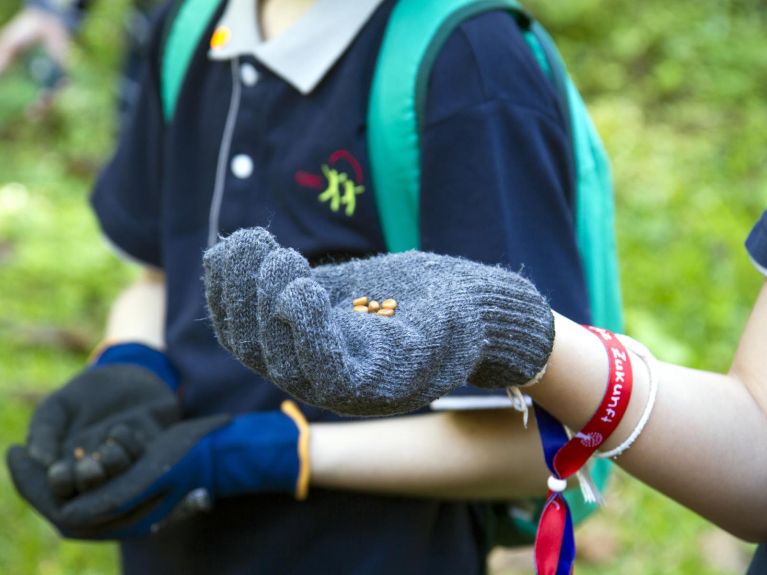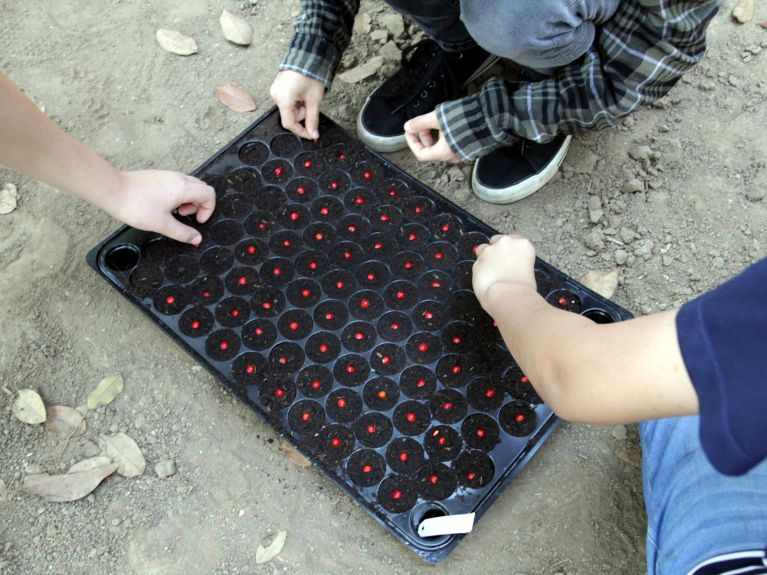Planting trees for a better future
How pupils at a German school in northern Thailand are doing their bit for the environment, and why that is so important there.

With a population of just under 130,000 Chiang Mai is the largest city in northern Thailand. But it’s got a problem. The air in the city is highly polluted, presenting a serious risk to the health of the population. Heat, unfiltered exhaust fumes, stubble burning by farmers and forest fires all contribute to the problems. The locals call the period from February to April “Smokey Season” due to the thick smog which hangs over the city.
The goal: a climate-neutral school
The Christian German School in Chiang Mai (CDSC) wants to help make things better. In 2019, the school initiated a reforestation project entitled “Trees for the Future”. Now pupils no longer only have their lessons in the classroom, but also out in the natural world, collecting seeds, tending plants and planting trees. The long-term aim of the project is to make the school climate-neutral. “The annual carbon footprint of CDSC and the families which belong to it is around 258 tonnes a year,” explains Sascha Stemmer, CDSC’s marketing manager. “Through the new forest we have planted we want to completely compensate for those emissions within 14 years.”Around 2,500 trees are already growing there, with another 500 added every year. The school has integrated topics about nature and environmental protection into its curriculum and stresses the importance of commitment to the environment.
I think it’s important to play my part for protecting the environment, particularly in Chiang Mai.
“We started out by collecting seeds at Doi Suthep, a mountain near our school. Afterwards we used the seeds to grow seedlings in our school’s own nursery. We had to water and look after the seedlings every day. When they were big enough, we planted them out in our school forest,” explains Oh Suh, who is in the 7th grade. “I think it’s important to play my part for protecting the environment, particularly in Chiang Mai. Through the smog you can see how much CO2 there is in the air, and we can take some of that back out again with our trees,” adds his classmate Aliassalem Hoshang.

The Forest Restoration Research Unit at the University of Chiang Mai and the Thai Environment Ministry are supporting the school’s efforts. “At the start of the school year the team from the university accompanies the 6th graders when they visit the forest and also in the school’s own nursery later on,” Stemmer says. “There they explain to the children how to look after the plants when they have just germinated, for example.”At the same time, biology lessons focus on topics to do with forests and sustainability.
Once the seedlings have grown in springtime, the pupils plant them out in an area allocated by the Environment Ministry. In the following school year, the pupils and their teachers return to their trees to weed, fertilise and measure the saplings. “When we saw how big our saplings were after just a few months, it was wonderful,” says 8th grader Eunkyo Jung. “It made me really happy and proud.”

Scientists at the university also benefit from the school’s initiative, as they can use the school’s forest for their own research. “In the spring of 2023 we used an area for planting which had previously been burned,” Stemmer explains. “Now the team from the university is investigating the extent to which that has influenced how the trees are growing.
The Christian German School is doing its bit for sustainability in other ways as well. For example, the school council has managed to ensure that no food is thrown away from the canteen on certain days. Working in partnership with Trash Hero, a local organisation, they collect rubbish from natural environments. The school also runs plant sales, holds talks on sustainability and organises workshops by parents for parents on topics such as composting.
Recognition in competition for German schools abroad
The CDSC school community was thrilled when “Trees for the Future” achieved second place for in a 2023 competition for German schools abroad run by the German Chamber of Commerce and Industry. “The project was a fantastic change from our normal school routine and it was so much fun. It would be great if more schools could follow the example of our project,” say On Suh and Aliassalem Hoshang. In a meeting with other schools they were able to inspire others about their project and encourage them to get involved. “We also got to know loads of other nice kids,” they say.Eunkyo Jung also wants to motivate other school pupils to plant trees, and she has other ideas, too. “In the end it is important to avoid wasting energy unnecessarily, such as by using the air conditioning less often,” she says. “People need to understand that they are responsible for polluting the environment, and everyone can help make things better.”


